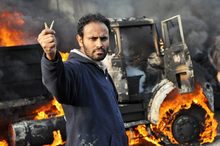
Presidential elections were held in Egypt in 2012, with the first round on 23 and 24 May 2012 and the second on 16 and 17 June. They were the first democratic presidential elections in Egyptian history. The Muslim Brotherhood declared early 18 June 2012, that its candidate, Mohamed Morsi, won Egypt's presidential election, which would be the first victory of an Islamist as head of state in the Arab world. It was the second presidential election in Egypt's history with more than one candidate, following the 2005 election, and the first presidential election after the 2011 Egyptian revolution which ousted president Hosni Mubarak, during the Arab Spring. However, Morsi's presidency was brief and short-lived, and he later faced massive protests for and against his rule, only to be ousted in a military coup in July that year.

The 2011 Egyptian revolution, also known as the 25 January Revolution, began on 25 January 2011 and spread across Egypt. The date was set by various youth groups to coincide with the annual Egyptian "Police holiday" as a statement against increasing police brutality during the last few years of Hosni Mubarak's presidency. It consisted of demonstrations, marches, occupations of plazas, non-violent civil resistance, acts of civil disobedience and strikes. Millions of protesters from a range of socio-economic and religious backgrounds demanded the overthrow of Egyptian President Hosni Mubarak. Violent clashes between security forces and protesters resulted in at least 846 people killed and over 6,000 injured. Protesters retaliated by burning over 90 police stations across the country.
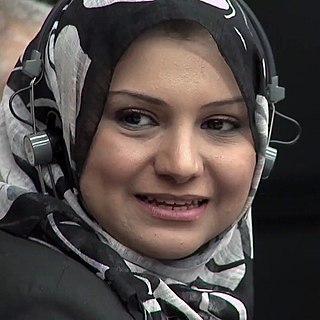
Asmaa Mahfouz is an Egyptian activist and one of the founders of the April 6 Youth Movement. She has been credited by journalist Mona Eltahawy and others with helping to spark a mass uprising through her video blog posted one week before the start of the 2011 Egyptian revolution. She is a prominent member of Egypt's Coalition of the Youth of the Revolution and one of the leaders of the Egyptian revolution.
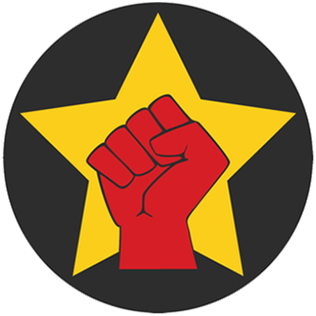
The Revolutionary Socialists (RS) are a Trotskyist organisation in Egypt originating in the tradition of 'Socialism from Below'. Leading RS members include sociologist Sameh Naguib. The organisation produces a newspaper called The Socialist.

The Egyptian Crisis was a period that started with the Egyptian revolution of 2011 and ended with the beginning of the presidency of Abdel Fattah el-Sisi in 2014. It was a tumultuous three years of political and social unrest, characterized by mass protests, a series of popular elections, deadly clashes, and military reinforcement. The events have had a lasting effect on the country's current course, its political system and its society.

The following is a chronological summary of the major events that occurred during the Egyptian Revolution of 2011, after Hosni Mubarak's resignation. Protests and riots led to the deaths of hundreds, injuries of thousands and the arrests of tens of thousands. Millions have mobilised the streets since the revolution.

Essam Abdel-Aziz Sharaf is an Egyptian academic who was the Prime Minister of Egypt from 3 March 2011 to 7 December 2011. He served as Minister of Transportation from 2004 to 2005.
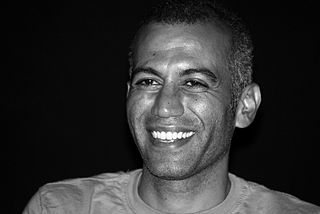
Hossam el-Hamalawy is an Egyptian journalist, blogger, photographer and socialist activist. He is a member of the Revolutionary Socialists and the Center for Socialist Studies.
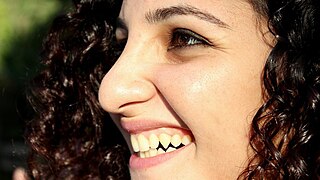
Mona Seif is an Egyptian human rights activist known for her participation in dissident movements during and after the 2011 Egyptian revolution, for her creative use of social media in campaigns, and for her work to end military trials for civilian protesters. She is a biology graduate student, investigating the BRCA1 breast cancer gene.

Wael Khalil is an Egyptian political activist known for his criticism of the Mubarak regime, his activity during the 2011 Egyptian revolution, and his blog WaELK.net which covers government, activism and sports.

The Maspero Massacre initially started as demonstrations in October 2011 by a group dominated by Egyptian Copts in reaction to the demolition of a church in Upper Egypt claimed to be built without the appropriate license. The peaceful protesters who intended to stage a sit-in in front of the Maspiro television building were attacked by security forces and the army, resulting in 24 deaths, mostly among the Coptic protestors, and 212 injuries, most of which were sustained by Copts.
On 1 February 2012, a massive riot occurred at Port Said Stadium in Port Said, Egypt, following an Egyptian Premier League football match between Al Masry and Al Ahly. Seventy-four people were killed and more than 500 injured after thousands of Al Masry fans stormed the stadium stands and the pitch following a 3–1 victory by their club and violently attacked Ahly fans, using clubs, stones, machetes, knives, bottles, and fireworks, trapping them inside the Al Ahly partition of the stadium. Many of the deaths were due to police refusal to open the stadium gates, trapping the Ahly fans inside, leaving some to die, and others being killed in a stampede while trying to escape. Civil unrest and severe clashes continued until 11 February, but general strikes ended on 13 February. Riots erupted in Cairo, Alexandria, and Suez. Police fired tear gas at protesters; thus, clashes erupted on the streets due to tear gas battles. Unrest calmed and ended on 13 February.

Khaled Ali is an Egyptian lawyer and activist. He is known for his advocacy for reform of government and private sector corruption and for promoting social justice and labor rights. He is the former head of the Egyptian Center for Economic and Social Rights (ECESR), and co-founder of the Front for Defending Egyptian Protesters and the Hisham Mubarak Law Center (HMLC).
Reem Maged is an Egyptian journalist and former host of the popular Baladna bel Masry talk show on Egyptian ONTV. Maged's popularity and renown have dramatically increased due to her critical coverage of political events since the 2011 Egyptian revolution, as well as her hosting of individuals on her show that are critical of the military Supreme Council of the Armed Forces, or SCAF, that has ruled Egypt since the resignation of Hosni Mubarak. She has been described as "Egypt’s best and arguably most vocal [female voice] in delivering the true happenings to the country on a nightly basis." Maged stopped presenting the show in 2013 and in 2014 joined a hunger strike campaign in solidarity with political prisoners.
El Teneen is the pseudonym of an anonymous 40–41-year-old Egyptian street artist and graffiti artist whose work gained popularity and notoriety in Egypt following the 2011 Revolution. El Teneen originally formed one half of the pair "Team El Teneen", or "Dragon Team"; however, the artist now works primarily independently. His works of art have been described as "icons of the 25 January revolution."
"Kazeboon", which means "liars" in Arabic, is a public-awareness and alternative media campaign in Egypt critical of the Supreme Council of the Armed Forces (SCAF). The Egypt's Supreme Council of the Armed Forces (SCAF), overtook President Hosni Mubarak in 2011, and claimed to transfer power to a civilian administration.

The following chronological summary of major events took place during the 2011 Egyptian revolution right up to Hosni Mubarak's resignation as the fourth President of Egypt on 11 February 2011.

The 2012–2013 Egyptian protests were part of the crisis in Egypt including the June 2013 protests, the July 2013 coup d'état, and part of the post-coup unrest. They saw varying opposition against three contiguous heads of state; namely, the Supreme Council of the Armed Forces (SCAF), Muslim Brotherhood, and the de facto ruling Egyptian Armed Forces.

George Isaac was an Egyptian politician and activist. During the later part of Hosni Mubarak's presidency, he co-founded the grassroots Kefaya opposition movement.

The Girl in the Blue Bra is the name given to an image of an Egyptian woman who participated in the Tahrir Square protests in opposition to Egypt's Supreme Council of the Armed Forces (SCAF), the military coup that ousted Hosni Mubarak during the 2011 Egyptian Revolution in opposition to Mubarak's presidency.
